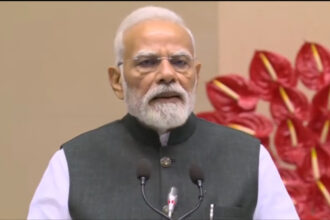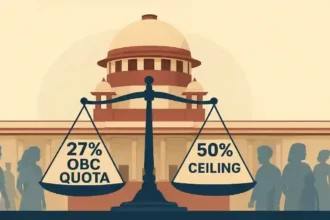
In a major policy shift that aligns Himachal Pradesh with constitutional mandates and long standing demands for social justice, the Himachal Pradesh Cabinet has approved the reservation of seats for Other Backward Classes OBC in urban local body elections. This move marks a decisive turnaround in the state’s approach to implementing equitable representation and is seen as a political and legal milestone.
- OBC Reservation in ULB Elections Approved
- What is the Supreme Court’s Triple Test?
- SEC vs Government: A Recent Constitutional Clash
- Why This Decision Matters
- What’s Next: Full Roadmap
- Legal Precedent and Political Significance
- Political Reactions
- A Turning Point for Inclusive Governance
- How General Category Candidates Are Affected
- Who Is Most Affected in General Category?
The decision, taken under the leadership of Chief Minister Sukhvinder Singh Sukhu, comes after weeks of political tension, legal uncertainty, and criticism from constitutional bodies like the State Election Commission (SEC).
OBC Reservation in ULB Elections Approved
The cabinet’s green signal clears the path for OBC reservation in municipal corporations, municipal councils, and nagar panchayats across the state. The Himachal Pradesh government also decided to form a dedicated Backward Classes Commission to conduct an empirical survey of the OBC population.
This move is aimed at ensuring the government satisfies the “triple test” laid down by the Supreme Court for providing OBC reservation in local governance.
The Cabinet has decided to move forward in line with constitutional obligations and the Supreme Court’s directives. OBC reservation in ULB elections will now be a reality in Himachal Pradesh,” a government spokesperson confirmed.
What is the Supreme Court’s Triple Test?
The Supreme Court of India has mandated three conditions known as the triple test that must be fulfilled before granting OBC reservation in local body polls:
1. Empirical Data Collection: A dedicated commission must gather quantifiable data on OBC representation in local governance.
2. Commission Setup: This commission must be statutory and possess defined authority.
3. Reservation Cap: The total reservation across SC, ST, and OBC groups must not exceed 50% of the total seats.
The Himachal Pradesh government, with this decision, has begun fulfilling all three conditions, starting with the formation of the Backward Classes Commission.
SEC vs Government: A Recent Constitutional Clash
Earlier in July 2025, the Urban Development Department attempted to postpone the reservation roster for ULB elections, citing lack of current census data. This move was met with severe backlash from the State Election Commission (SEC), which argued that:
Only the SEC has the constitutional authority to decide election timelines and reservation rosters.
As per Article 243U and the Himachal Pradesh Municipal Act, 2011 Census data remains valid and binding until newer data is released.
The state government’s move amounted to an illegal encroachment on the SEC’s powers.
The SEC’s firm response and legal reminders are believed to have influenced the cabinet’s course correction.
Why This Decision Matters
The OBC reservation in ULB elections is not merely an administrative step but a reflection of deeper socio-political currents in India. Himachal Pradesh has, until now, lagged behind other states like Madhya Pradesh, Maharashtra, and Uttar Pradesh in implementing the OBC quota at the urban governance level.
This new policy is expected to:
- Ensure fair political participation of backward communities.
- Bring Himachal Pradesh in compliance with national constitutional standards.
- Avoid legal battles and delays in municipal elections.
Furthermore, this decision has significant electoral implications ahead of the 2027 Assembly polls, as it could consolidate OBC support for the ruling Congress government.
What’s Next: Full Roadmap
Following cabinet approval, the Himachal government will take the following steps:
1. Formation of the Backward Classes Commission, responsible for collecting quantifiable data on OBCs across urban areas.
2. Preparation of a fresh reservation roster in consultation with the Commission’s findings and SEC guidelines.
3. Legislative action expected during the monsoon session of the Assembly (August 18 – September 2, 2025) to formalize the decision.
4. State Election Commission to announce new dates for ULB elections post roster finalization.
Legal Precedent and Political Significance
This development mirrors actions taken by other states. In 2022, Madhya Pradesh was permitted by the Supreme Court to conduct local body elections with OBC quotas after completing the triple test, including an empirical commission report.
Similarly, Maharashtra and Uttar Pradesh had to pause their local body elections due to non compliance. Himachal Pradesh’s proactive approach now places it among the states aligning their electoral practices with constitutional jurisprudence.
Moreover, this decision fulfills a long standing demand by social justice activists and political outfits seeking proportional representation for backward classes at every level of governance.
Political Reactions
While the Congress party has hailed the move as “historic and inclusive”, the BJP and other opposition parties have accused the government of “bowing under pressure” and “delaying the elections for political gain.”
“The state government is trying to manipulate local body elections using reservation politics. This sudden approval after postponement reeks of opportunism.”
However, social groups and constitutional experts have widely welcomed the move, terming it a victory for democratic representation.
A Turning Point for Inclusive Governance
The decision to implement OBC reservation in Himachal Pradesh urban local body elections is a watershed moment in the state’s political and administrative landscape. It not only ensures compliance with the Supreme Court’s triple test but also sends a message that constitutional institutions like the SEC must be respected.
The OBC reservation in urban local body elections marks a crucial step toward inclusive governance and upholding the ideals of social justice and equity. The success of this policy will now depend on how transparently and efficiently the Commission functions and whether political will sustains the momentum of reform.
Stay Connected with The News Drill for more updates.
Contact us: contact@thenewsdrill.com
Submit a tip or story: editor@thenewsdrill.com
How General Category Candidates Are Affected
1. Reduced Number of Open Seats
With OBCs now added to the roster of reserved categories (alongside SCs and STs), the open seats for General category candidates will reduce, especially in urban areas with small populations. This directly impacts aspiring candidates from unreserved backgrounds.
2. Greater Competition for Open Seats
The OBC Quota in Himachal Urban Local Body Elections intensifies competition in the remaining unreserved wards. Candidates from General, OBC (non-reserved), and other groups will now compete more aggressively for fewer opportunities.
3. Rotation Based Reservation May Disqualify Potential Candidates
The government often applies a rotation system while reserving seats. Many General category candidates may find their home ward reserved for OBCs or other categories, rendering them ineligible to contest from their strongest area.
Who Is Most Affected in General Category?
General (Unreserved) candidates without EWS certificates.
Independent candidates or first time contestants lacking party backing.
Young aspirants seeking grassroots leadership roles in urban governance.
Such individuals will now face a double disadvantage no caste based reservation and fewer contestable seats.
















